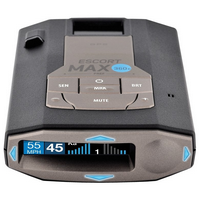Recently a Maryland woman was ticketed for not speeding on Interstate 95. The offense? She was doing 63 in a 65mph zone in the left lane.
The officer cited her for failing to keep right while driving two miles below the speed limit. Two miles. The woman, who said she was forced to slow down because of windy conditions on the road, was stunned. She filed a complaint. The response from Maryland police? Take it to court.
While there is no question that driving within the speed limit is certainly lawful, and the woman should not have received a ticket for following the law, the issue wasn't really about that at all. The real issue is that she was doing it in the left lane.
Now, this is certainly a topic that can spark heated debate, and usually does. On the one hand, the left lane is considered the passing lane, while the right lane is for slower traffic. Drivers going under the speed limit are required to use the right lane and allow faster traffic to pass them on the left. There is also a minimum speed that must be maintained while driving on a highway. In Maryland, driving in the left lane is allowed as long as the driver is not blocking the flow of traffic or going 10mph under the posted speed limit. If other drivers are moving faster and want to pass, Those going slower should move to the right.
However, there is another side to the argument as well, just as legal and valid. The passing lane is for passing slower traffic at the posted speed limit. It is not a license for speeding. Passing slower vehicles is fine, as long as you are not exceeding the limit yourself. If you exceed the speed limit to pass another vehicle, you are breaking the law. In the case of the driver in Maryand, she was only two miles per hour under the the posted speed limit while in the left lane, which is well within the 10 mile per hour margin required by Maryland to lawfully drive on the left. In other words, although she was in the passing lane, technically she was still within the law.
By issuing the citation, the officer sent a clear message to this driver: if you're not speeding, you may get a ticket. Yes, as strange as it may sound, it seems that these days you can be penalized for breaking the law, or you can be penalized for keeping it.
This is why it is important to know when you are being watched.
I have been told by critics of radar detectors that these devices only encourage drivers to break the law and enable them to speed. While there are lead-footed drivers who do buy radar detectors to evade speed traps, that isn't the only reason to have one. It isn't why I have a radar detector. I have a better reason to own one. I want to know who is watching me, how they are watching, when they are watching and where they are.
Public safety, traffic enforcement, call it what you will. It's still monitoring and surveillance, and that bothers me. Sure, we need good law enforcement to protect the public, and I have no problem with a marked patrol car on the road or at the side of it in plain view, to deter crime and provide the assurance of protection to law abiding citizens.
But secretly scanning me with radar, lasers and infra-red cameras without my knowledge is just a little uncomfortable. It's too big brother. I want to know what they are doing and why. Radar/laser detectors and traffic camera detectors are useful because they keep me alert to such activities and help me watch who is watching me.
Am I overreacting? Am I being too paranoid? With the prospect of using drones on our own citizens, is my concern about traffic surveillance over the top?
Before you answer my questions, ask the woman in Maryland what she thinks. After all, she was trying to obey the law, and she still got a ticket. If she had a radar detector in her vehicle, is it possible she would have been alerted that she was being watched so she could either match the speed limit or move into the right lane in time and avoid a citation? Perhaps, perhaps not. At least she would know she was being watched.
As a law-abiding citizen, wouldn't you want to be alerted to a potential problem before it occurs so you can take steps to correct it and stay within the law?
This is why it is important to know when you are being watched.



